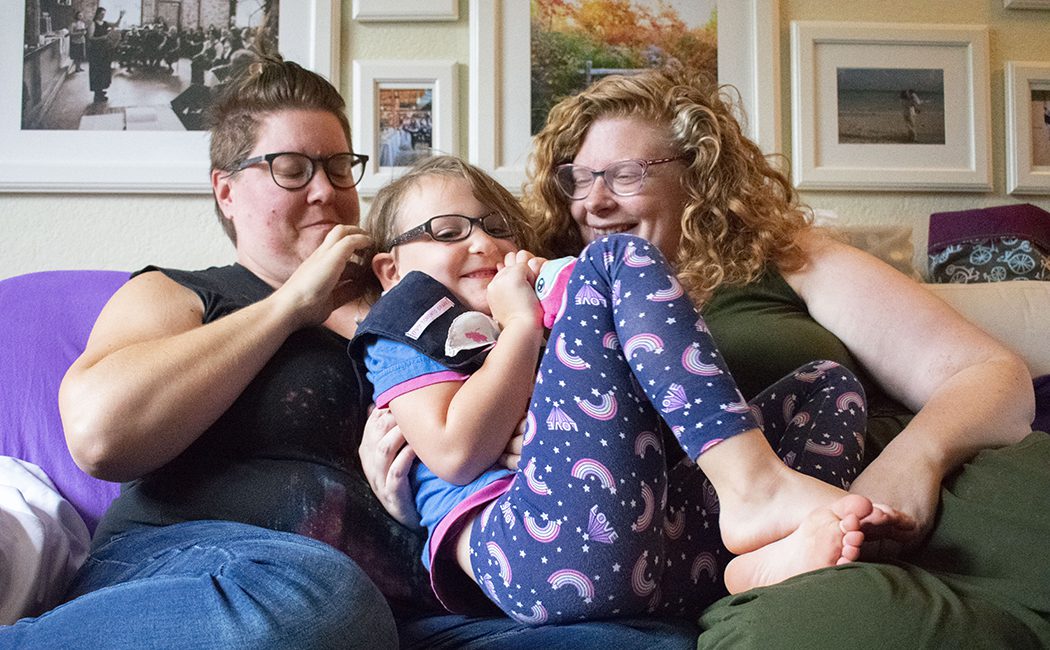Grade 1 students don’t usually explain to other kids how they were born or how they can have a family without a father, but Eleanore Hargreaves is used to it.
Eleanore comes from a queer family in Leaside. It’s been a topic on the jungle gym since her first days in kindergarten. After the provincial government nixed the plan to use the new 2015 sex-ed curriculum in elementary schools, the six-year-old had questions.
“The first time Eleanore was bullied, she was in tears,” says Merlin Hargreaves, who uses they/them pronouns and is one of Eleanore’s mothers. “This year, when we asked our child’s teacher what she would do when Eleanore had to answer questions from kids in the class, the teacher said, ‘I heard her doing that the other day. It was great.'”
It wasn’t the answer they were looking for.

Merlin Hargreaves (left) and Helen Hargreaves say their child Eleanore had supportive teachers in kindergarten, but worry that future teachers may not be as considerate. Merlin Hargreaves hopes Eleanore won’t have to explain herself to others for the rest of her life.
“It shouldn’t be her job and she shouldn’t have to reveal so much about her family and her life to make them understand that stuff,” Merlin Hargreaves says.
The teacher tried to reassure them, explaining she has never witnessed homophobia in East York, hosts an inclusive classroom and that Eleanore would be ‘cool’ for having two moms. When Hargreaves challenged that stance by asking about bullying, the answer was devastating.
“The teacher said, ‘There’s nothing you can do about it. People don’t change; you can’t change the system,'” Hargreaves says. “She never said she would teach the updated curriculum.”
Now, they’re approaching the principal for a response.
“I hope to hear that she is supportive of the sex-ed curriculum, that she would talk to the teacher and help change the school system if need be,” Hargreaves says.
I think we’re overreacting a bit. Our education isn’t being stolen from us.
— Evan Kanter, Don Valley West director of recruitment for the Ontario PC Youth Association
But not everyone was happy with the new curriculum. The Thorncliffe Parents Association held multiple protests in 2015 opting instead to “let kids be kids.” They also encouraged parents to boycott their schools, hosting a group homeschool at Thorncliffe Park.
While the Facebook group moderators and members did not comment, Evan Kanter, the Don Valley West director of recruitment for the Ontario PC Youth Association, doesn’t care for the backlash towards using the old curriculum.
“I think we’re overreacting a bit. Our education isn’t being stolen from us,” he says.
However, the protests left at least one East York parent concerned.
“It’s become a lightning rod for polarization in our community,” says Rabea Murtaza, a moderator of East Enders Against Racism. “Why is there this mass freak-out about gender identity? I’m flabbergasted about why we would make this even harder and add to this discrimination.”
After the protests, Murtaza co-founded a movement for families just like the Hargreaves and worried parents like her via Facebook — People for Ontario’s Sex-Ed Curriculum. It grew to more than 11,000 likes in one week and became a province-wide page.
“There’s a community in East York which is progressive and cares,” Murtaza said.
It also prompted her to create a smaller, online community for Muslims who support the newer sex-ed courses.
Kanter thinks the current consultation process, launched Sept. 28, will do a better job of making sure “all parents get a fair consultation.” And while he thinks the new curriculum “does need to be taught, it’s a matter of what the appropriate age is and how it can accommodate various religions.”
Amelia Golden, a former Peel district school board investigator from East York, says the appropriate age is before they grow up.
“I see firsthand the trouble that these young adults get into both in the way that the confusion around what consent is and the impact of intoxication on the ability to form a real consent,” she says.
In 2018, it shouldn’t be up to chance.
—Rabea Murtaza, co-founder of People for Ontario’s Sex-Ed Curriculum
While she’s been using the language of consent with her 11-year-old twin boys their entire life, Golden says everyone is at risk without the updated sex-ed curriculum.
“I’m concerned about my kids knowing what consent is,” she says. “There are so many different examples, people who are 19, 20, 21, who weren’t raised on the 2015 curriculum and are blowing it.”
But Golden also warns it could be fatal for trans kids. Research from 2017 shows trans teens aged 14-18 were five times more likely to think of dying by suicide, with three-quarters of them reporting self-harm in the past year.
“Most of them have not told their parents when they’re in grade school, most of them haven’t told their friends, most might not even know themselves,” Hargreaves says. “They need our support and we’re yanking it away from them.”
Murtaza is hopeful that some teachers will be supportive, but the inconsistency is troubling.
“In 2018, it shouldn’t be up to chance,” she says.
In speaking with other parents, Hargreaves senses the old curriculum will make it harder to talk to children about gender identity and consent. Golden believes the impact of the curriculum will resonate.
“We’re not only losing out on the kids,” she says, “we’re missing the next generation, too.”




